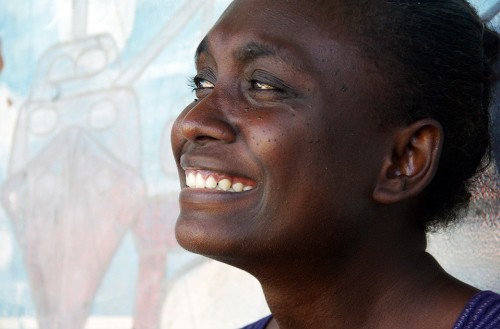Image: Kristina Sogavare of the Solomon Islands’ Young Women’s Parliamentary Group.
One of the most important issues facing Pacific democracies is how to realise democracy’s promise to support inclusive development. I have been struck by the many common challenges that emerging democracies face, regardless of region, as outlined in Alina Rocha Menocal’s discussion on the complex relationship between democracy, state-building and development. However, I think her insights also bring to the fore some of the unique problems that the Pacific region faces.
Recent democratic trends have been positive in some parts of the Pacific, particularly Tonga and Fiji (where national elections in 2014 marked a return to democracy following its suspension in 2006). But in the larger Melanesian states of Papua New Guinea (PNG) and the Solomon Islands democracy faces some major obstacles. These include the increasingly moneyed nature of politics, weak governance, corruption and poor development outcomes.
Before considering these issues, it should be noted that Pacific democracies are not ‘transitional’ in the sense of being part of the ‘third wave’ of democratisation. Pacific democracies were introduced as key components of post-colonial inheritances, and have generally proven resilient to significant pressures arising from state fragility, economic vulnerability and, in some cases, violent conflict.
Yet it is the longevity of some Pacific democracies that actually throws into sharp relief one of the biggest democratic challenges facing the region: the seeming inability of established democratic systems to support more inclusive forms of development, particularly in Melanesia which fares poorly on a range of development criteria.
The disconnect between democracy and development is placing established democratic systems under increasing pressure, eroding their integrity and risking their long-term legitimacy. In PNG, Solomon Islands and Vanuatu, political elites have sought, or are seeking, to ‘stabilise’ national parliaments through a raft of electoral, political party and parliamentary reforms. Part of the rationale for doing so has been to improve the development environment by giving politicians space to take a longer policy view. In practice, such reforms have appeared more focused on strengthening executive powers, and risk weakening accountability mechanisms (including the role of parliament), potentially paving the way for more authoritarian, corrupt and moneyed forms of politics.
The inability of democratic politics to deliver clear development outcomes has also been used to justify the introduction of constituency development funding (CDF) models. These give local MPs discretionary funds to deliver services directly to their constituents (bypassing central government). While such funds are common in Africa, South Asia and other regions, in Solomon Islands and in PNG they are much larger (relative to other forms of government expenditure) and regulated less closely.
There is a debate among observers of Melanesian politics about the merits of this constituency funding model (Vanuatu has yet to go down this path). Proponents of CDFs justify them as an expression of a grass-roots style of democracy prevalent in Melanesia, arguing that they foster direct relationships with MPs that go some way to connecting an increasingly inaccessible and otherwise absent state to communities (perhaps representing a least-worst option).
Opponents argue that CDFs reinforce clientelistic and moneyed forms of politics and are used by executives to consolidate their power. They argue that this weakens democratic accountabilities and hollows out already fragile state systems by bypassing central government and redirecting limited resources away from critical public goods.
A more pragmatic view is that the scale of such funds means they will now be impossible to remove politically, and that the real challenge is making them more accountable rather than seeking to wind them back.
In my opinion, one of the biggest costs of CDFs is that they undermine already weak formal states and narrow the development possibilities open to Melanesian societies. They privilege localised forms of development (solar panels, water tanks, outboard motors, school fees) over scaled, productivity enhancing national investments (transport and communications infrastructure, health and education) which are more likely to underpin transformational development.
Institutional experimentation, including reforms to ‘stabilise’ parliamentary politics and to extend CDF models, highlights how Pacific democracies are transitioning in their own ways. But experience in Melanesia suggests that any reforms to democratic systems need to be coupled with a broader range of developmental policies if they are to create more favourable and inclusive development environments. These must include long-term support for state-building and good governance, alongside ongoing support to empower citizens to undertake more developmental forms of collective action and political participation.
Supporting effective collective action is particularly challenging in a region that lacks programmatic parties, and where civil society is often marginalised from formal policy processes that are generally weak. Not only that, but key members of society lack representation in formal political institutions: the Pacific has the world’s lowest level of female parliamentary representation.
So what approaches could help Pacific democracies deliver for their citizens? I’d argue that, given the structural impediments against large-scale state-led development approaches, the best bet would be supporting issues-based coalitions to work more effectively in democratic spaces to progress meaningful reforms.
A good Pacific example is the urban bus routes campaign backed by the Solomon Islands’ Young Women’s Parliamentary Group. This saw a civil society group with significant knowledge of formal parliamentary processes – and who enjoyed the formal patronage of the prime minister – lead a broad-based community campaign calling for more inclusive urban bus routes in Honiara. The group then leveraged this public support to successfully call for a special parliamentary committee of inquiry. Its findings provide a basis for a more inclusive public transport regime, although implementation remains a challenge.










